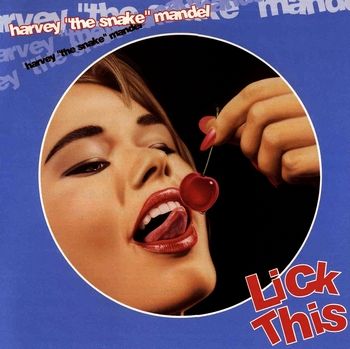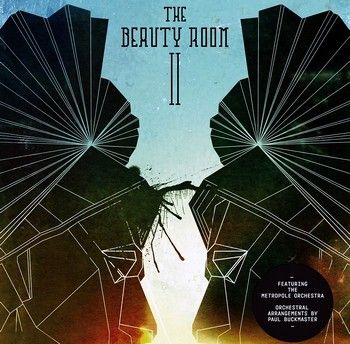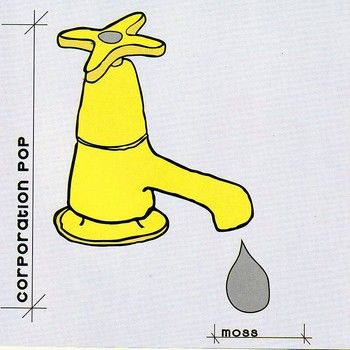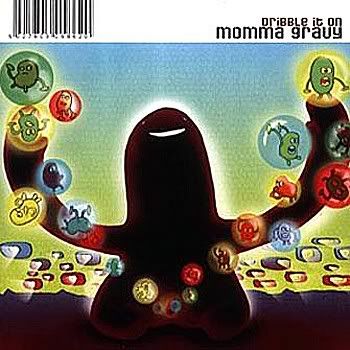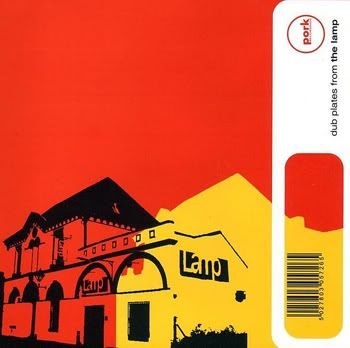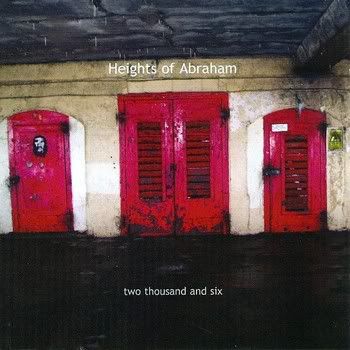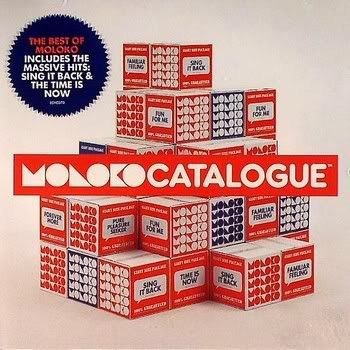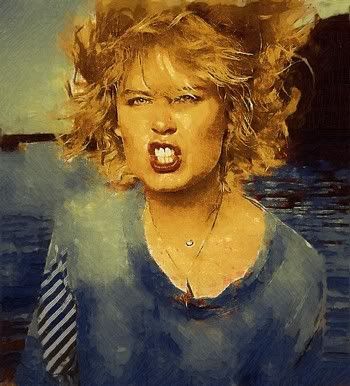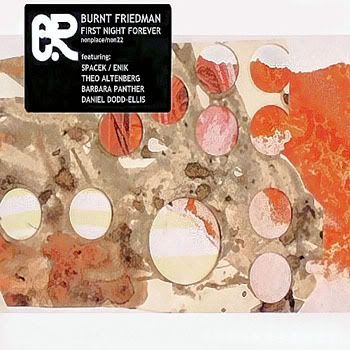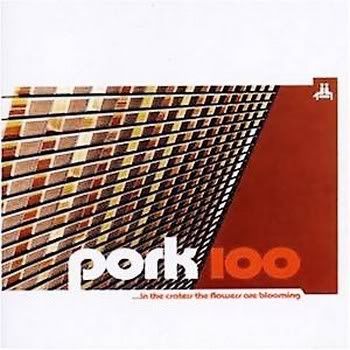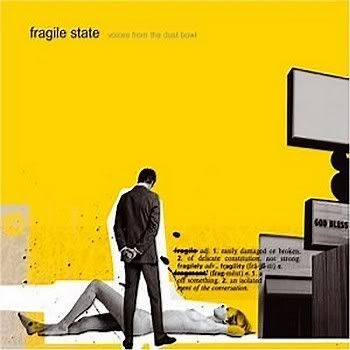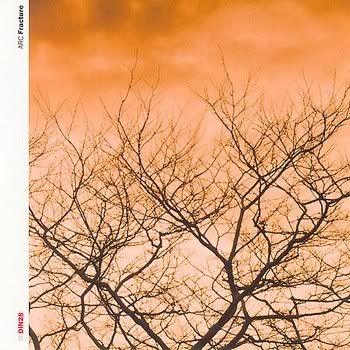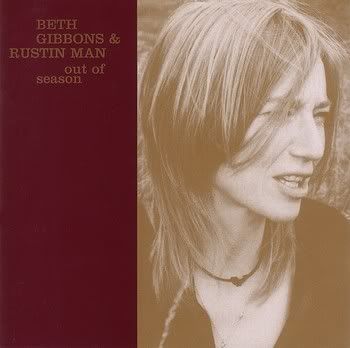
Beth Gibbons & Rustin Man -
Out Of Season - 2002 - Go! Beat
READ THIS REVIEW - Portishead were a simulacrum, their anchors sunk deep in sample culture with Beth Gibbons' torch singer stylings and Adrian Utley's soundtrack scrapings operating merely as tools in the sample yard. In its evocation of forgotten jazz, blues, film music, and hip-hop, Portishead's Dummy was the quintessence of "even better than the real thing", yet when the magic ceased on the band's eponymous sophomore album, it was ultimately due to their desire to be the real thing. On Portishead, the trio retained their hip-hop elements only in principle-- they played every sound themselves, pressed the results to dubplates, and then cut and looped them into backing tracks. In practice, Portishead had abandoned the sampler's art-- the recontextualization of sound and the creation of history from history-- and so, the thrill had gone. It's no coincidence that the best post-Dummy release from the Portishead camp remains DJ Andy Smith's eclectic mash-up, The Document. Beth Gibbons, one assumes, was never much into hip-hop. Hers, after all, was the bleeding heart at the center of it all, and her remarkable, tortured voice (equal parts Billie Holiday and Sandy Denny), remains capable of gravitas for any occasion. "Mysteries" opens Out of Season brilliantly, folk arpeggios plucking their way around Beth's gasps while a cadre of gospel singers in the background oooooh the record into being. "Tom the Model" takes that cue and runs with it, answering delicate folk verses with a nicely retro big-band soul chorus. Beth attacks the song with verve, and even the hint of self-pity in the lyric is kicked into touch by her defiance. If only the rest of Out of Season displayed that energy. Instead, we're quickly plunged into moodiness for the sake of moodiness, overwhelmed by Gibbons' frankly unpitiable obsession with her own misfortune. At their best, Portishead turned this kind of smoky cabaret blues into an invigorating showpiece. But replace crackling vinyl and subwoofer bass with somber piano and mournful cello, and all you're left with is... well, a pretty goddamn miserable woman who happens to have a great voice. That's "Show" for you, and for all its miserable pleading, it's as forgettable a song as Gibbons has ever crooned. "Romance" tries some moaning french horns on for size, and frankly looks ridiculous in them. Chrissakes, who suggested a 90-second french horn solo was a good idea? And again, if Gibbons' Billie Holiday routine was engaging in Portishead's hip-hop context-- reconstituted blues that fit their mix perfectly-- here it threatens to go a little pantomime. And now to the issue of Rustin Man: What is the deal with calling yourself Rustin Man? Are we supposed to let that slide? Turns out it's an alias for ex-Talk Talk bassist Paul Webb. Now, Talk Talk did some wonderful things-- Spirit of Eden and Laughing Stock both proved what can be achieved with emphasis on mood and atmosphere. Here, however, Webb allows Gibbons to dictate both, and it just doesn't work. Striking as her voice can be, she does little to prove that it has the emotive range to match its power. Elsewhere, "Resolve" is a pretty but inconsequential folk tune, and "Drake" and "Funny Time of Year" waltz their way in and out of the frame without forcing you to take much notice. Which leaves "Rustin Man" the song, a frustrating hint of what might have been. Its pure ambience (think Dot Allison's recent album, if produced by Tim Friese-Greene) sounds remarkably modern next to the trad fare that precedes it, and the warbling and sizzling of the synths forces Beth to be a little more active with her vocal-- she slips in and out of the mix, allowing atmosphere to build rather than overwhelming it with her moods. Sonically, of course, it's no less bleak than the rest of this album, and though it does bring in some much-needed excitement at the end, it's just not powerful enough to save the whole from its vanilla dejection. © Jesse Fahnestock, November 20, 2002, © 2008 Pitchfork Media Inc. All rights reserved -
NOW READ REVIEWS FURTHER DOWN PAGE. A.O.O.F.C would be very interested to hear your comments about this album.
TRACKS
A1 Mysteries (4:38) - TRACK 1
Accordion [Wind], Effects [Sonic Fx] - Beth Gibbons
Backing Vocals - Joy Rose , Lauraine McIntosh* , Rachael Brown
Engineer - Adrian Utley , Andy Montgomery , Neil Perry , Niven Garland
Engineer [Assistant] - Paul Webb
Guitar, Effects [Sonic Fx], Guitar [Ebo], Other [Rain] - Adrian Utley
Producer [Additional] - Adrian Utley
A2 Tom The Model (3:40) - TRACK 2
Backing Vocals - Lurine Cato , Marion Powell , Michelle John
Bass [Mexican Acoustic] - Simon Edwards
Cello - Ben Chappell , Frank Shaefer* , Jonathan Tunnell , Martin Loveday
Congas, Percussion [Additional] - Martyn Barker
Drums, Timpani - Clive Deamer
Engineer - Andy Montgomery , Niven Garland , Phill Brown
Engineer [Assistant] - Albert Pinheiro , Geoff McLaughlin* , Mark Bishop
Guitar [Baritone] - Adrian Utley
Harmonica - Mark Feltham
Horns - Leo Green , Mat Colman* , Matt Holland
Orchestrated By [Strings], Conductor [Strings] - Nick Ingman
Organ - Gary Baldwin
Percussion - Lee Harris , Paul Webb , Sam Webb (2)
Piano - John Baggott
Producer [Additional] - Adrian Utley , Niven Garland
Viola - Bruce White , Pete Lale* , Phil Dukes*
Violin - Benedict Cruft* , Boguslav Kostecki* , Chris Tombling , Dave Woodcock* , Eddie Roberts (2) , Gavyn Wright , Mark Berrow , Pat Kiernan* , Perry Montague-Mason , Warren Zielinski
A3 Show (4:27) - TRACK 3
Cello - Rachael Samuel
Double Bass - Simon Edwards
Engineer - Beth Gibbons , Niven Garland , Phill Brown
Engineer [Assistant] - Albert Pinheiro , Geoff McLaughlin* , Mark Bishop
Flute - Rebecca Samuel
Piano - John Baggott
A4 Romance (5:09) - TRACK 4
Backing Vocals - Joy Rose , Lauraine McIntosh* , Rachael Brown
Cello - Ben Chappell , Frank Shaefer* , Jonathan Tunnell , Martin Loveday
Double Bass - Mary Scully
Drums - Lee Harris
Engineer - Niven Garland , Phill Brown
Engineer [Assistant] - Albert Pinheiro , Geoff McLaughlin* , Mark Bishop
Euphonium - Steve Cooper
Flugelhorn - John Barclay
Flute [Alto] - Andy Findon* , Nina Robertson
Guitar, Bass - Adrian Utley
Horns - John Pigneguy , Nigel Black
Orchestrated By [Strings & Horns], Conductor [String & Horns] - Nick Ingman
Organ - Paul Webb
Producer [Additional] - Niven Garland
Trombone - Richard Edwards (2) , Roger Harvey
Trombone [Solo] - Mark Nightengale
Viola - Bruce White , Peter Lale , Phil Dukes*
Violin - Chris Tombling , Eddie Roberts (2) , Gavyn Wright , Pat Kiernan* , Perry Montague-Mason
A5 Sand River (3:51) - TRACK 5
Acoustic Guitar, Guitar [Ebo] - Neil MacColl
Backing Vocals, Guitar - Paul Webb
Double Bass - Simon Edwards
Drums - Clive Deamer
Engineer - Niven Garland , Phill Brown
Engineer [Assistant] - Albert Pinheiro , Geoff McLaughlin* , Mark Bishop
Keyboards - Paul Webb
Percussion - Lee Harris
Piano - John Baggott
Producer [Additional] - Adrian Utley , Nik Lloyd
Synthesizer [Moog] - Adrian Utley
B1 Spider Monkey (4:10) - TRACK 6
Acoustic Guitar - Graham Kearns
Drums, Percussion - Lee Harris
Engineer - Adrian Utley , Neil Perry , Niven Garland
Engineer [Assistant] - Geoff McLaughlin* , Mark Bishop
Guitar, Bass, Organ [Pedals] - Adrian Utley
Piano, Electric Piano [Wurlitzer] - John Baggott
Producer [Additional] - Adrian Utley , Niven Garland
B2 Resolve (2:51) - TRACK 7
Acoustic Guitar, Engineer - Beth Gibbons
Mixed By [Assistant] - Mark Bishop
Producer [Additional] - Adrian Utley
B3 Drake (3:54) - TRACK 8
Acoustic Guitar - Neil MacColl
Backing Vocals - Joy Rose , Lauraine McIntosh* , Rachael Brown
Bass [Mexican Acoustic] - Simon Edwards
Effects [Keyboard Fx] - Paul Webb
Engineer - Niven Garland , Phill Brown
Engineer [Assistant] - Albert Pinheiro , Geoff McLaughlin* , Mark Bishop
Harmonica - Mark Feltham
Other [Vibes] - Frank Ricotti
Percussion, Drums - Lee Harris
Piano - John Baggott
Producer [Additional] - Niven Garland
B4 Funny Time Of Year (6:48) - TRACK 9
Acoustic Guitar - Pete Glenister
Acoustic Guitar, Guitar, Bass, Bass [Tremolo] - Adrian Utley
Drums - Clive Deamer
Engineer - Niven Garland
Engineer [Assistant] - Mark Bishop
Organ - Gary Baldwin
Piano, Accordion, Guitar - Paul Webb
Producer [Additional] - Adrian Utley , Niven Garland
B5 Rustin Man (4:18) - TRACK 10
Engineer - Beth Gibbons
Harmonica - Mark Feltham
Mixed By [Assistant] - Mark Bishop
Organ, Effects [Sonic] - Paul Webb
Written-By - Beth Gibbons (tracks: 1 to 4, 6 to 10) , Paul Webb (tracks: 1, 2, 4 to 10)
MORE ALBUM INFO.
Artwork By [Design] - Ryan Art
Mastered By - Frank Arkwright
Mixed By - Phill Brown (tracks: 1 to 7, 9, 10)
Photography - Eva Vermandel
Photography [Additional] - Nik Lloyd , Pete Dickinson
Producer - Beth Gibbons , Paul Webb
Programmed By - Paul Webb
Programmed By [Additional] - Steve McNichol
Mastered at The Townhouse.
REVIEWS
Described as a one-off collaboration, the most evocative female voice of the nineties, Beth Gibbons, has joined forces with former Talk Talk bassist Paul Webb, now trading under the guise of Rustin Man. With Portishead, Gibbons had played a vital role in the conception of two of the decade's most astounding musical artefacts. Five years have now passed since the release of "Portishead", and gaps like these are never normally perceived as being creatively beneficial. However, Gibbons never really conformed to the norms. Beth never really gave a damn about record sales, PR or public perception, and she usually stayed out of the limelight. In fact not much has been heard of her in the last five years, with this record just creeping up on us, seemingly out of nowhere. Any fears that her extended sojourn from music has drained her creative juices are immediately quashed with the remarkable opener "Mysteries". The most remarkable thing about this track, and indeed the album itself, is the changes in Gibbons' voice. Imagine if Joni Mitchell had teamed up with some British folkies like Nick Drake and John Martyn in the early seventies. This is what "Mysteries" sounds like. Gibbons' voice is stripped down, as is the understated production of Webb, which is dominated by quiet acoustic and outdoor sounds. Not only does this record sound fundamentally different to Portishead, but it also seems that Gibbons is using "Out Of Season" as a testing ground for her voice (she is supposedly working on new Portishead material with Geoff Barrow). Indeed, her vocal remains the most important instrument throughout the record. "Tom The Model" sees her adopt a more soulful voice while tracks like "Romance" and "Drake" see her sound closer to two of the finest singers of all time: Billie Holiday and Nina Simone. Her vocal on "Show" is husky, possibly the closest to her Portishead "sound". It was as if this track was recorded in a late night jazz bar sometime after midnight with just a piano, before Joe Boyd (Drake's Producer) popped in and decided to add some cellos at the end of it, with Alison Goldfrapp on backing vocals! Simply sublime. Like many of the album's songs, it takes the best facets of genres and mixes them together rather magically. The most wonderful embodiment of this is in the album's highlight "Funny Time of Year". It starts quietly, with yet again an acoustic dominated sound. However, as Beth's voice changes in the song, so does the music. It shifts from folk to jazz, combining elements of electronic furriness on the way. "Out Of Season" leaves us the way it came in, with the slow-burning "Rustin Man". Each listen of "Out Of Season" rewards the listener, with hidden subtleties and charms emerging. The three female backing vocalists alone deserve a medal, as they consistently sound wonderful, without intruding on Beth's "ground". It's as if they are the plectrum/bow to her strings – vital, yet inconspicuous. Webb does a wonderful job also, content to stay in the background. Portishead fans will be glad to see the involvement of Adrian Utley. However, it is Gibbons who shines throughout, instilling herself as one of the great female vocalists. By the end of this breathtaking experience, we have an album that can be put in the same quality bracket as "Dummy" and "Portishead". "Out Of Season" may be a one-off, and it may not "fit" neatly into any category, but what we have is a late contender for Album of the Year. © Ciarán Ryan © www.cluas.com
Hailed by some as work of genius and by others as a pretentious statement, Beth Gibbons’s first album is definitely causing a bit of a stir. Better known for being the voice of Portishead, Beth Gibbons has cast an unforgettable mark on British music. With a truly unique voice, able to carry a multitude of emotions by adapting to the atmosphere of a song, Beth had long since joined Marianne Faithful and Liz Fraser in the ranks of the greatest British female voices.
Formed in Bristol in the mid nineties, Portishead brought a new dimension to the trip hop scene with cinematic melodies, emotional definition and hip hop beat structures with their first album, Dummy, released in 1994. Instantly recognised as a classic recording, Dummy went on to become one of the biggest sellers that year, not only in the UK and Europe, but also across the Atlantic, where the band enjoyed great success on the alternative scene, despite their refusal to attend any interview. Both Barlow and Gibbons are famously media shy. The band’s second, eponymous, album followed three years later, with a live album recorded at New York’s Roseland Ballroom with a thirty-five piece orchestra released in 1998. Since then, the band members have been taking an extended break, with Barlow working on new songs for Portishead, and Gibbons working on this project.
Written and recorded with former Talk Talk Paul Webb, Out Of Season is everything but a variation on Portishead. Webb and Gibbons met long before the singer joined the band, while Webb was auditioning for a singer for his band, O’rang. The idea of collaboration between the two friends came up at the end of the last Portishead tour. With very little material to work on to start with other than the melody for the beautiful Mysteries and lyrics for Rustin Man, the pair developed an approach which lead them to work with stripped down soundscapes, emphasising entirely on Gibbons’ voice and interpretation.
Unanimously recognised as one of the finest piece of song writing in British music history, Mysteries, which opens the album, is a delicate pop song built around a simple guitar line on which Gibbons’ voice blows a gentle breeze. Defining the timeless character of this album, the song is a haunting reflection on personal beliefs and destiny as Gibbons almost whispers ‘And when the timebell blows my heart / And I have scored a better day / Well nobody made this war of mine’. Carrying the same melancholic views on existence and depicting distorted love stories and lives, the rest of the album retain the same intrinsic characteristics all the way through. Very often using elements of nature and passing time as metaphors to emphasise on the down-to-earth atmosphere of the music, the duo elaborate rarely on the simple, acoustic, arrangements, only once reaching for dramatic effect, on the stunning Funny Time Of Year. Starting with just an acoustic guitar to support Beth’s fragile voice, the track slowly builds up to a magnificent coda. Perhaps the closest to the ambience of Portishead, and at the same time the furthest away, Funny Time Of Year presents this album with its most poignant moment.
Reminiscent of the poetry of a Nike Drake, Out Of Season is totally unique, and most definitely out of time. A very strong piece of work, this album will be remembered as a milestone in Gibbons' career. 5/5 © themilkfactory 1999-2006 All Rights Reserved
The Portishead songstress strays from the flock. Beth Gibbons is the woman behind Portishead’s heartfelt, crooning vocals. And before you ask – no they haven’t split, a new album is currently in development. Out Of Season is a one-off project with Rustin’ Man, aka Paul Webb from Talk Talk, a pre-Portishead friend. And it’s great. Much more than Portishead without the beats, the album has a timeless feel. Think Carole King, Billy Holiday or Joni Mitchell. Typically it’s downbeat, but this time there’s hope and it’s certainly more optimistic than her previous projects. "I do like sad songs," Beth says. "I find it really hard to write a happy song without it sounding somehow melancholic.” But the familiar smoky atmospherics are there, featuring Portishead’s Adrian Utley on guitar work which complements Beth’s distinctive, hauntingly honest vocal. It’s a gentle autumnal sounding album, gracefully produced, with themes of nature and isolation. Let’s hope it isn’t really a one-off. © Matt Walton 24 October 02 [http://www.bbc.co.uk/dna/collective] Note: some of the content on collective is generated by members of the public. The views expressed are theirs and unless specifically stated are not those of the BBC. The BBC is not responsible for the content of any external sites referenced. If you consider this content to be in breach of the House Rules please alert our moderators. www.bbc.co.uk/dna/collective/
It's been several years since the one-two punch of Portishead's Dummy and the group's equally astonishing self-titled follow-up, so it's difficult to imagine what a new record by the Bristol natives might sound like after all this time. Whether it's a carbon-copy of their previous work or a decided departure, Portishead's as-yet-unreleased third studio album is bound to disappoint someone. (Perhaps it's this manufactured pressure that keeps the album from being completed.) Last year, the trip-hop trio's head mistress, Beth Gibbons, released her first "solo" album (in actuality, a joint-effort with Paul Webb, bassist of '80s band Talk Talk, and Portishead guitarist Adrian Utley), and though most hardcore fans have probably snagged the import already, Out Of Season is finally getting a proper stateside release (which includes a bonus live performance of the Velvet Underground's "Candy Says"). Geoff Barrow may have been Portishead's sonic backbone, but Gibbons provided the humanity, the heart, the soul and the softly wrenching sorrow. Tracks like "Tom The Model" evoke Barrow and Utley's cinematic orchestrations of sweeping strings, brass and pumping organs, but Webb's delicate arrangements are less in-your-face, allowing Gibbons' every gritty vocal tic, every whimper and every pained lyric to rise to the surface. The wraith-like "Spider Monkey" begins with a hypnotic Wurlitzer pattern, followed by Gibbons' worried meditation on time. Acoustic guitars and ethereal sound effects ensue, capsizing into a quietly frenzied panic. Gibbons' lyrics are familiar and spooky, whether she's observing the seasons change ("Autumn leaves/Pretty as can be/Everyone can see, everyone except me," she sings atop the supermarket smooth-jazz of Webb's "Sand River") or (surprise!) sardonically enjoying life ("God knows how I adore life" are the very first words on the album). As versatile as Gibbons' vocal is, though, you won't find her wailing in the sinister Portishead style, and she rarely draws on the killer-kitten coquettishness of Dummy. Instead, Webb and Gibbons' influences—from folk (Nick Drake, Joni Mitchell) to jazz (Ella Fitzgerald, Nina Simone)—float skillfully to the surface of Out Of Season. The only moment Gibbons truly lets go is at the very end of the gorgeously terrifying "Funny Time Of Year," in which she howls, "I can see no blossom, no blossom on the trees!" (Talk about Seasonal Affective Disorder!) Out Of Season is still one of last year's, this year's (or any year's) best, and it's probably as close as we'll ever get to the long-promised new Portishead album. Here's hoping it's not. © Sal Cinquemani, © slant magazine, 2003.
